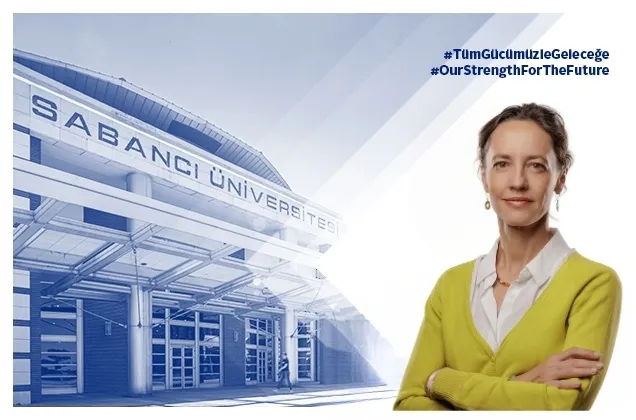04/03/2024
Öykü Arkan Tunç, member of Sabancı Business School, was entitled to receive the Marie Skłodowska-Curie Actions (MSCA) Postdoctoral Fellowship, one of the most important programs offered by the European Union for postdoctoral studies, with her project titled "Developing a Culture of Whistleblowing and Empirical Examination of Whistleblowing Mechanisms".

We talked with our faculty member Öykü Arkan Tunç about her project and the importance of the MSCA Postdoctoral Fellowship.
gazeteSU: Can you tell us a little about your project? Can you briefly summarize the subject, scope and objectives of the project?
Öykü Arkan Tunç: Our project aims to instigate a change in how society perceives whistleblowers and promote a whistleblowing culture in Turkey that is inspired by the global trends in internal whistleblowing mechanisms in the US and Europe. Whistleblowing is one of the most effective means of exposing and deterring wrongdoing, even though those who blow the whistle on such misconduct are often subjected to social and organizational stigma despite their vital role in uncovering corruption. They face reprisal, demotion, harassment, and even dismissal from their jobs. Whistleblowers play a crucial role in unveiling internal and/or external organizational misconduct, fostering a culture rooted in integrity and transparency. To support this culture, organizations need to establish robust whistleblowing channels that promote open communication without the fear of reprisals. To that end, this project aims to reshape attitudes towards whistleblowers through normative ethics training, assess the global effectiveness of whistleblowing mechanisms, and design internal reporting systems that take into account the psychological factors influencing potential whistleblowers, ultimately fostering a culture that encourages whistleblowing.
This project fills significant gaps in examining the psychology behind whistleblowing and moves beyond existing scholarship by integrating global and local perspectives and mechanisms for whistleblowing and connecting business ethics, organizational behavior, and law literature to foster a culture of whistleblowing. Through investigating the psychological perspectives on whistleblowing and integrating the whistleblowing mechanisms in the European Union, the United States, and beyond, our project offers unique opportunities for internal whistleblowing mechanisms in Turkey and Europe.
Can you give some information about the importance of The Marie Skłodowska-Curie Actions (MSCA) Postdoctoral Fellowship?
The significance of the Marie Skłodowska-Curie Actions (MSCA) Postdoctoral Fellowship is evident in the spheres of research and academic progress. As a distinguished component of the European Union's Horizon 2020 program, this fellowship is designed to bolster researchers' training and career advancement. The fellowship supports projects that frequently cut across diverse disciplines, urging researchers to collaborate at the crossroads of different fields and contribute to the advancement of interdisciplinary knowledge and innovation. MSCA incentivizes researchers to conduct their projects in a country other than their own, fostering international collaboration and cultivating a diverse research environment.
Furthermore, fellows can integrate into a broader research community, obtaining opportunities to participate in networking events, conferences, and collaborations that can profoundly influence their professional growth. They can have the opportunity to collaborate with the non-academic sector, enabling them to interact with industry partners and apply their skills and knowledge to real-world challenges, thereby fostering innovation.
Overall, attaining an MSCA Postdoctoral Fellowship is a prestigious accomplishment, elevating the researcher's standing and creating avenues for prospective career opportunities through promoting international collaboration and interdisciplinary research.
Can you share the important aspects of your project that enabled it to win this fellowship?
Our project is well aligned with the EU policies concerning the evolving trends in whistleblowing practices and the HE Work Programme, effectively addressing current developments in whistleblowing. It integrates literature from business ethics, law, and organizational behavior to provide a comprehensive understanding of the subject. Furthermore, despite Turkey’s business connections to the EU, currently, there are no specific legislations or guidelines for whistleblowing in Turkey. Given that Turkey requires an alignment with the EU’s whistleblower mechanisms, we believe that it is timely to examine whistleblower perceptions in society and implement effective internal reporting mechanisms that are flexible to fit different organizations.
With this gap in mind, we developed a comprehensive project proposal with four objectives that span various academic fields:
- Examining and comparing current attitudes toward whistleblowing in the US, Europe, and Turkey to create a positive change in whistleblower perceptions through normative ethics training in organizations.
- Providing an intercultural perspective on the psychology behind whistleblowing by systematically comparing the effectiveness of different whistleblowing mechanisms in the US and Europe.
- Bridging the gap between legislative whistleblowing procedures and implementation of organizational internal whistleblowing mechanisms by focusing on operating effectiveness.
- Developing internal whistleblowing mechanisms for organizations in Turkey that provide moral and economic benefits for all stakeholders.




